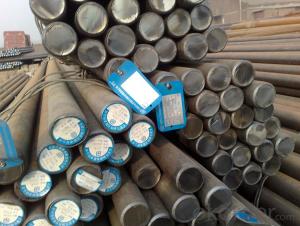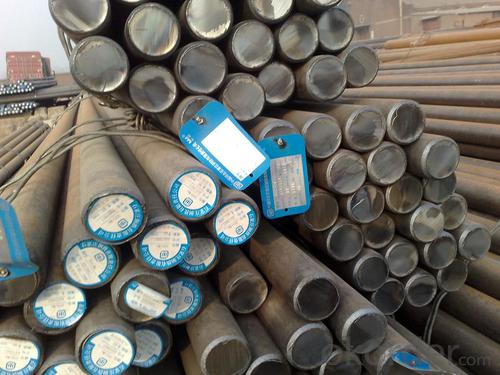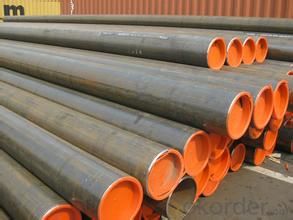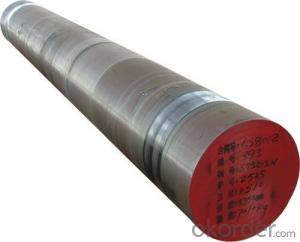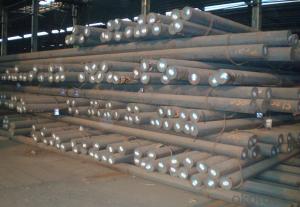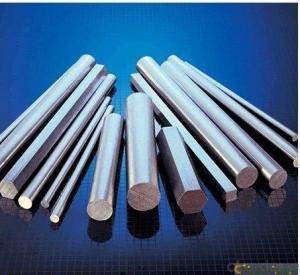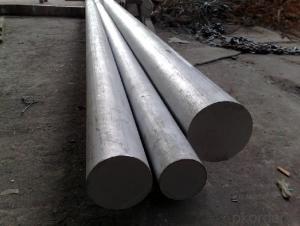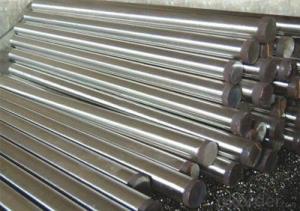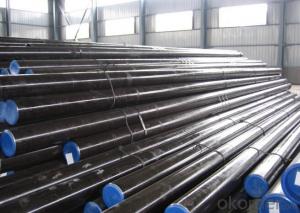Alloy Steel Spring Steel Round 9260 Forged Steel
- Loading Port:
- China main port
- Payment Terms:
- TT OR LC
- Min Order Qty:
- 30 m.t.
- Supply Capability:
- 10000 m.t./month
OKorder Service Pledge
OKorder Financial Service
You Might Also Like
Specification
Product information:
Alloy Steel 6150 Spring Steel Bars
Specification
1. Produce Standard: GB, AISI, ASTM, SAE, EN, BS, DIN, JIS
2. Produce processes: Smelt Iron -EAF smelt Billet - ESR smelt Billet -Hot rolled or forged get the steel round bar and plate
3. Heat treatment: Normalized / Annealed / Quenched+Tempered
4. Quality assurance: All order we can received third party inspection, You can let SGS, BV,.. and others test company test and inspect our products before Goods shipping.
5. Applications: 6150 steel is a kind of advanced spring steel , used for important spring with a large cross-section and high load,and the valve spring, piston, spring, the relief valve spring with working temperature below 300 ℃ .
| Available Specification | |||
| Round Bar | Diameter (mm) | Length (mm) | |
| 5-1500 | 2000-5800 | ||
| Plate | Thickness (mm) | With (mm) | Length (mm) |
| 20-1000 | 200-1500 | 2000-5800 | |
| The specification can be customised! | |||
| Chemical Composition | ||||||||
| Grade | C | Si | Mn | P | S | Cr | Ni | V |
| AISI 6150 | 0.48-0.53 | 0.15-0.35 | 0.70-0.90 | ≤0.035 | ≤0.050 | 0.80-1.10 | — | ≥0.15 |
| DIN 51CrV4 | 0.47-0.55 | ≤0.40 | 0.70-1.10 | ≤0.035 | ≤0.035 | 0.90-1.20 | — | 0.10-0.25 |
| BG 50CrV | 0.46-0.54 | 0.17-0.37 | 0.50-0.80 | ≤0.030 | ≤0.030 | 0.80-1.10 | ≤0.035 | 0.10-0.20 |
Product Show:
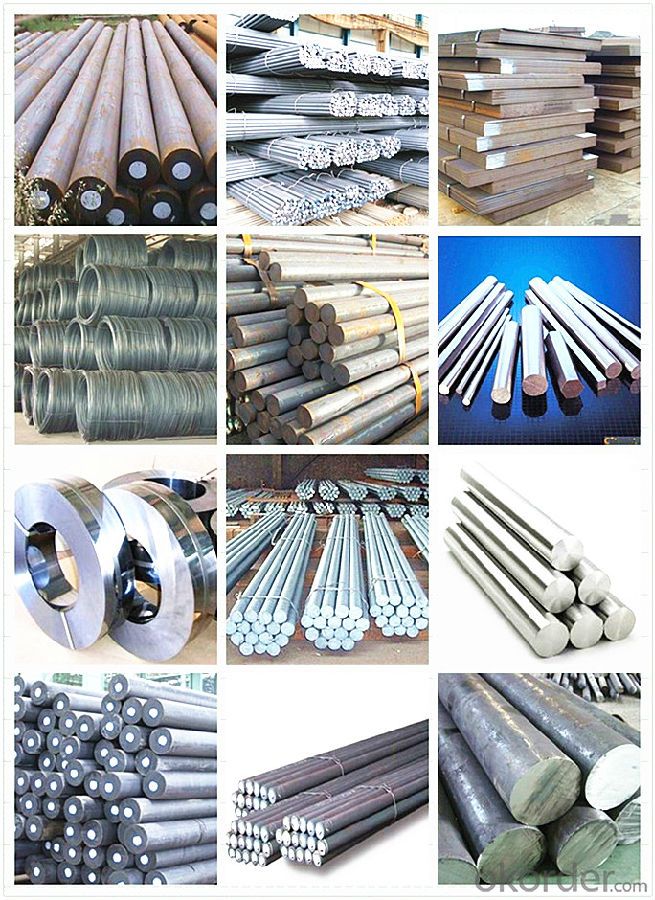
Workshop Show:
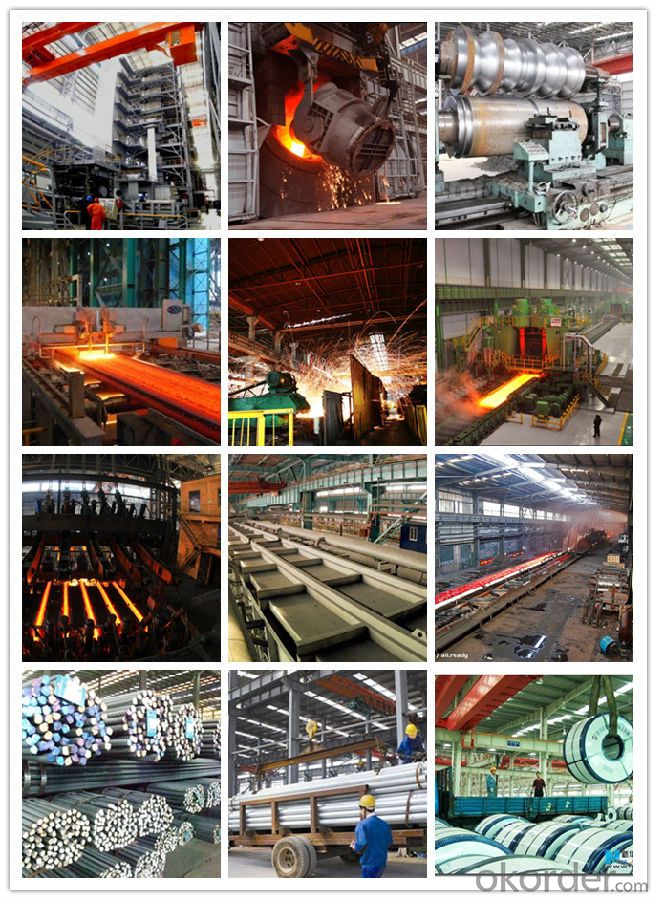
Shipping
1. FedEx/DHL/UPS/TNT for samples, Door-to-Door;
2. By Air or by Sea for batch goods, for FCL; Airport/ Port receiving;
3. Customers specifying freight forwarders or negotiable shipping methods!
Delivery Time: 3-7 days for samples; 5-25 days for batch goods.
Payment Terms
1.Payment: T/T, L/C, Western Union, MoneyGram,PayPal; 30% deposits; 70% balance before delivery.
2.MOQ: 1pcs
3.Warranty : 3 years
4.Package Informations: 1) EXPORT, In 20 feet (GW 25 ton) or 40 feet Container (GW 25 ton)
2)as customer's requirement
Why choose us?
(1) The leading exporter in China special steel industry.
(2) Large stocks for various sizes, fast delivery date.
(3) Good business relationship with China famous factories.
(4) More than 7 years steel exporting experience.
(5) Good after-sales service guarantee.
- Q: What are the main advantages of using special steel in the marine industry?
- The main advantages of using special steel in the marine industry are its high strength and durability, corrosion resistance, and ability to withstand extreme conditions. Special steel provides the necessary structural integrity to withstand the harsh marine environment, including exposure to saltwater, waves, and impact forces. It also offers excellent resistance to corrosion, which is crucial for maintaining the integrity and longevity of marine structures. Moreover, special steel's ability to withstand extreme temperatures and pressures makes it suitable for various marine applications, such as shipbuilding, offshore structures, and marine equipment.
- Q: How is special steel machined?
- Various methods and techniques are utilized to machine special steel, depending on the specific properties and requirements of the steel. Turning, for instance, is a common method where a cutting tool is employed to eliminate material from the rotating steel workpiece. This process is employed to shape the steel and produce cylindrical parts like shafts or rods. Milling, on the other hand, involves the use of rotating multi-point cutting tools to remove material from the steel workpiece. This technique is employed to create flat surfaces, slots, or intricate shapes on the steel. Grinding is yet another frequently used method for machining special steel. It entails the use of abrasive wheels to remove material and achieve a smooth surface finish. This method is often employed for precision machining, where precise tolerances and smooth finishes are necessary. Drilling is also a significant machining process for special steel. It involves using a rotating drill bit to create holes in the steel workpiece. This process can be carried out manually or with the use of CNC (Computer Numerical Control) machines to ensure accurate hole placement. Apart from these methods, other techniques such as broaching, honing, or lapping can also be employed to machine special steel, depending on the specific requirements and desired outcome. It should be noted that machining special steel necessitates specialized tools, equipment, and expertise due to the hardness and unique properties of the material. The cutting tools used for machining special steel are often made from high-speed steel or carbide, which can withstand the high temperatures and pressures generated during the machining process. In summary, machining special steel involves a combination of cutting, grinding, and drilling techniques to shape, refine, and finish the steel workpiece in accordance with the desired specifications and requirements.
- Q: Can special steel be used in the chemical processing industry?
- Yes, special steel can be used in the chemical processing industry. Special steel alloys are specifically designed to withstand the harsh conditions of chemical processing, including exposure to corrosive chemicals, high temperatures, and pressure. These steels have excellent resistance to corrosion and can maintain their mechanical properties even in extreme environments. Therefore, they are commonly utilized in the construction of chemical reactors, pipelines, storage tanks, and various other equipment used in the chemical processing industry.
- Q: What are the different certifications available for special steel?
- There are several certifications available for special steel, including ISO 9001, ISO 14001, ISO/TS 16949, and AS9100. These certifications ensure that the steel meets specific quality standards, environmental management practices, automotive industry requirements, and aerospace industry standards, respectively.
- Q: What are the different quenching techniques used for special steel?
- There are several quenching techniques used for special steel, including oil quenching, water quenching, polymer quenching, and air quenching. Each technique has its own advantages and disadvantages and is chosen based on the specific requirements of the steel being quenched. Oil quenching provides a slower cooling rate, resulting in reduced risk of cracking and distortion. Water quenching, on the other hand, provides a rapid cooling rate, making it suitable for achieving maximum hardness. Polymer quenching offers a controlled cooling rate, allowing for the desired balance between hardness and toughness. Air quenching is the slowest cooling method, providing the least hardness but also the least risk of distortion. The choice of quenching technique depends on the desired properties of the special steel and the specific application it will be used for.
- Q: What are the different coating options available for special steel?
- Some of the different coating options available for special steel include galvanizing, powder coating, electroplating, and organic coatings such as epoxy or polyurethane. These coatings provide protection against corrosion, enhance durability, and improve the aesthetics of the steel.
- Q: How is corrosion-resistant stainless tool steel used in the production of food processing equipment?
- Corrosion-resistant stainless tool steel is used in the production of food processing equipment due to its ability to resist rust and corrosion caused by exposure to moisture, chemicals, and food acids. This steel is specifically designed to withstand the harsh conditions present in food processing environments, ensuring the equipment remains durable and hygienic. It is commonly used to manufacture blades, cutting tools, and various components of machines that come into direct contact with food. Its corrosion-resistant properties make it a reliable and safe choice for maintaining the quality and integrity of food during processing.
- Q: What are the challenges in surface treating special steel?
- When it comes to surface treating special steel, a range of challenges can arise due to the unique properties and composition of the material. Some of the main challenges that need to be addressed are as follows: 1. Hardness: Special steels often possess a high level of hardness, which poses difficulties in achieving effective surface treatment. Traditional methods like heat treatment or chemical processes may not be sufficient to modify the surface properties without impacting the core strength. 2. Surface contamination: During the surface treatment process, special steels are vulnerable to contamination. Even the smallest traces of impurities or foreign materials can compromise the integrity of the treated surface. It is crucial to maintain a controlled environment and utilize clean equipment to minimize the risks of contamination. 3. Complex alloy composition: Special steels are typically alloyed with various elements to enhance specific characteristics, such as corrosion resistance or high temperature stability. This complex composition can make it challenging to find suitable surface treatment techniques that can effectively modify the surface properties without negatively affecting the overall performance of the alloy. 4. Adhesion and coating uniformity: Ensuring good adhesion and coating uniformity on special steel surfaces can be problematic. The surface characteristics and microstructure of special steels can make it challenging for coatings or treatments to properly and evenly adhere. Special attention must be paid to surface preparation and the selection of appropriate primers or coatings to ensure optimal adhesion and uniformity. 5. Heat sensitivity: Some special steels may be sensitive to heat during surface treatment processes. Excessive heat exposure can lead to changes in the material's properties, including structural alterations or deformation. It is essential to carefully control temperatures and employ suitable cooling methods to prevent any undesirable effects on the steel during the surface treatment process. 6. Cost: The process of surface treating special steel can be costly due to the specialized equipment, materials, and expertise required. Additionally, the challenges mentioned above can increase the complexity and time needed for surface treatment, resulting in higher costs. It is crucial to take these factors into consideration when planning and budgeting for surface treatment on special steel components.
- Q: How does special steel contribute to the agriculture aftermarket industry?
- Special steel plays a crucial role in the agriculture aftermarket industry by providing high-performance components and equipment that enhance productivity and efficiency in farming operations. Special steel, also known as alloy steel, is engineered to have specific properties such as strength, durability, corrosion resistance, and heat resistance, making it ideal for various agricultural applications. One of the key contributions of special steel to the agriculture aftermarket industry is the production of durable and reliable machinery parts. These parts, such as plowshares, blades, and tines, are subjected to harsh conditions, including intense wear, impact, and exposure to corrosive substances. Special steel components can withstand these challenges and offer extended service life, reducing downtime and maintenance costs for farmers. Furthermore, special steel is used in the manufacturing of agricultural equipment like tractors, harvesters, and sprayers. These machines require robust and lightweight materials to ensure optimal performance and fuel efficiency. Special steel grades provide the necessary strength while keeping the weight of the equipment low, allowing farmers to cover larger areas and increase productivity. Additionally, special steel alloys are used in the production of precision tools, such as cutting blades and drill bits, used in precision farming techniques. These tools enable farmers to perform tasks with high accuracy, such as soil sampling, seeding, and crop monitoring. The durability and sharpness of special steel tools enhance the precision and effectiveness of these operations, leading to improved crop yields and resource utilization. Moreover, special steel is also employed in the construction of infrastructure related to the agriculture aftermarket industry. For example, steel beams and columns are used in the fabrication of storage facilities, barns, and grain silos, providing structural strength and stability. This infrastructure allows for efficient storage, handling, and transportation of agricultural products, contributing to the overall efficiency of the industry. In conclusion, special steel is an essential component in the agriculture aftermarket industry as it contributes to the production of durable machinery parts, lightweight equipment, precision tools, and robust infrastructure. By offering enhanced strength, durability, and corrosion resistance, special steel helps farmers improve productivity, reduce downtime and maintenance costs, and achieve better crop yields.
- Q: Can special steel be used for structural applications?
- Yes, special steel can be used for structural applications. Special steel refers to a wide range of steel alloys that are specifically designed to possess enhanced mechanical properties, such as increased strength, durability, and corrosion resistance. These qualities make special steel suitable for various structural applications, including buildings, bridges, pipelines, and heavy machinery.
Send your message to us
Alloy Steel Spring Steel Round 9260 Forged Steel
- Loading Port:
- China main port
- Payment Terms:
- TT OR LC
- Min Order Qty:
- 30 m.t.
- Supply Capability:
- 10000 m.t./month
OKorder Service Pledge
OKorder Financial Service
Similar products
Hot products
Hot Searches
Related keywords
